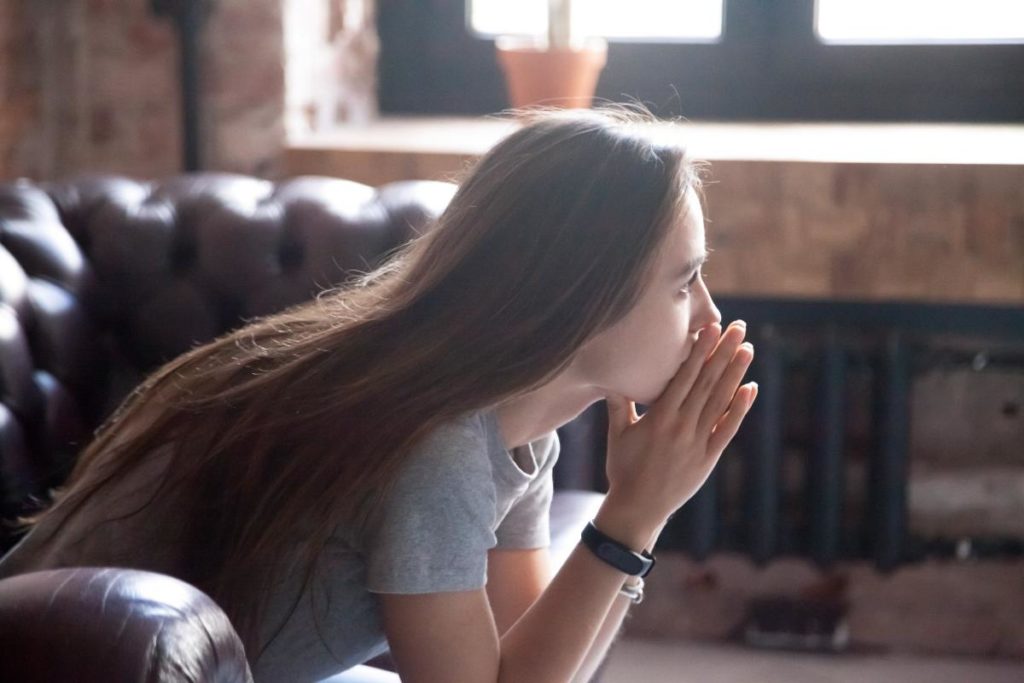Everyone has anxiety from time to time, but what is an anxiety attack? What differs anxiety symptoms from anxiety attack symptoms. When it comes to anxiety attacks, each second that passes during an episode can feel like minutes or hours as your chest tightens up. Breathing can become difficult, and you’re overcome with intense and irrational fear. Many people have described anxiety attacks as feeling like they’re drowning on dry land.
If you or a loved one is struggling with anxiety attack symptoms, Vertava Health’s anxiety and addiction treatment can help. Contact us at 844.470.0410 to learn more about how our treatment can benefit you.
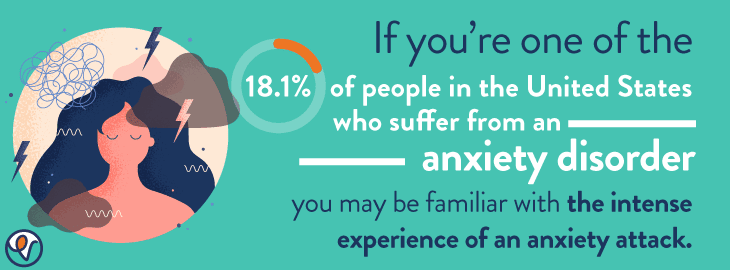
What Is An Anxiety Attack?
An anxiety attack is a sudden feeling of intense fear or discomfort that can last for a few minutes to several hours. Symptoms may include chest pain, nausea, dizziness, rapid heart rate or lightheadedness. The condition often occurs during times of high stress and anxiety. The first step toward managing and coping with anxiety attacks is to understand what they are and how to identify them.
Anxiety Attack Symptoms
It is completely normal to feel anxious in response to certain life situations and experiences. This is due to the natural “fight-or-flight” response when we’re faced with stress or danger. Anxiety attacks go beyond the typical anxiety or nervousness of everyday life and can lead to feelings of helplessness and other intense negative emotions. Anxiety attacks can show themselves in a wide variety of different ways; it depends on the individual. That said, these attacks generally include both physical and psychological symptoms. While some people may have a few mild symptoms, others can have a wider variety of more intense symptoms. It all comes down to how the body reacts to stress. Some of the possible physical symptoms of an anxiety attack include:
- Rapid heart rate and chest pain
- Choking sensation and shortness of breath
- Trembling or shaking
- Dizziness
- Upset stomach, diarrhea, and other intestinal issues
- Fatigue
- Restlessness, insomnia, and difficulty sleeping
- Muscle aches, tension, and pain
- Tingling or numbness in hands or feet
Some of the possible psychological symptoms may include:
- Intense feelings of panic
- Feeling a loss of control
- Irritability
- Easily frightened or on edge
- Difficulty concentrating
- Feeling like your mind has gone blank
- Irrational fear
- Distress and worry
- Feeling like you need to escape
What Is the Difference Between Anxiety Attacks and Panic Attacks?
You may hear the terms “anxiety attack” and “panic attack” used in a way that suggests they mean the same thing. This makes sense because they share some common symptoms, such as rapid heartbeat, shortness of breath, and dizziness. 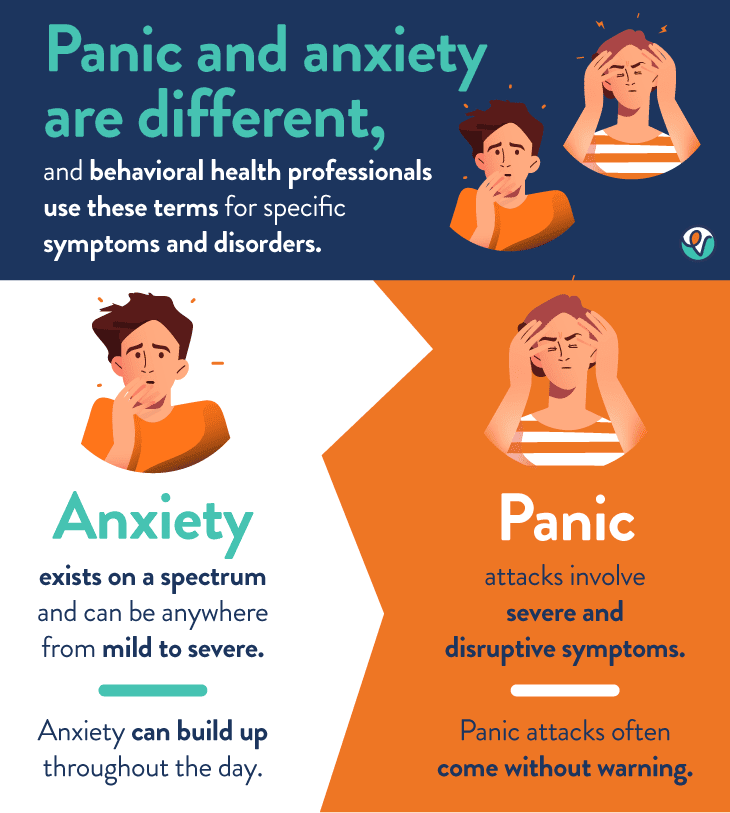 In reality, panic and anxiety are different, and behavioral health professionals use these terms for specific symptoms and disorders. Panic attacks are a sudden, abrupt surge of intense discomfort or fear that is accompanied by physical and mental symptoms. While this may sound similar to anxiety attacks, there are some key differences between the two. These differences include:
In reality, panic and anxiety are different, and behavioral health professionals use these terms for specific symptoms and disorders. Panic attacks are a sudden, abrupt surge of intense discomfort or fear that is accompanied by physical and mental symptoms. While this may sound similar to anxiety attacks, there are some key differences between the two. These differences include:
- Anxiety is hardwired into the brain as part of its natural fight-or-flight response. It’s typically related to and triggered by something that is perceived as threatening or stressful. Panic attacks aren’t always cued by stressors; in fact, they most often occur without warning.
- Anxiety exists on a spectrum and can be anywhere from mild to severe. For example, you may have anxiety weighing on the back of your mind as you go about your day-to-day business. Panic attacks, on the other hand, most often involve severe and disruptive symptoms.
- Physical symptoms of panic attacks are typically much more severe than those of anxiety attacks, leading to extreme difficulty breathing and other intense conditions. People who have panic attacks have described them as feeling like their body seizes up while they are powerless until the attack passes.
- While panic attacks often come without warning, anxiety can build up throughout the day, providing much more warning and time for preparation and prevention techniques.
How Do I Tell if Someone Is Having an Anxiety Attack?
When an anxiety attack reaches its peak, it can become overpowering and crippling. Attacks are most often triggered by an episode of stress and exposure to fear. The person’s initial response to the trigger will quickly develop into a full-blown anxiety attack. Many of the symptoms of an anxiety attack are also symptoms of other serious medical conditions, such as a heart attack. Because of this, it’s not always an easy task to identify when a person is having an anxiety attack or something even more serious. If the person has a history of heart-related issues as well as anxiety attacks, such episodes should be treated as if it is a heart attack. If the symptoms of the attack occur out of the blue and without warning, it’s very possibly a panic attack. If specific events or emotions trigger an attack more than once, there may be an underlying anxiety disorder that needs to be addressed.
What Can I Do to Reduce Anxiety and Anxiety Attacks?
In many cases, anxiety attacks are caused by certain emotional triggers or perceptions of threat. Identifying and avoiding these triggers can help reduce the chance of having an attack, but if the triggers are a normal part of everyday life, complete avoidance may be impossible. In these cases, it may be time to explore your options for the treatment of anxiety disorder. 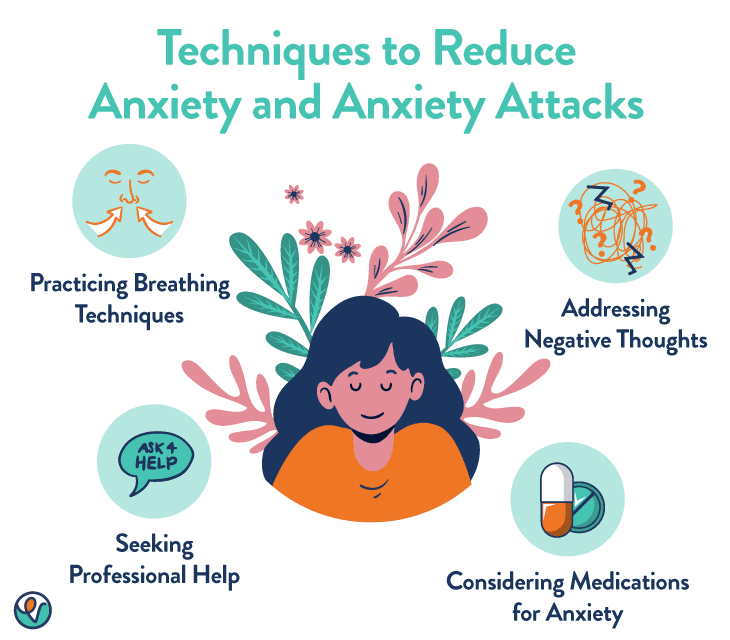 That said, there are a number of effective tools and techniques you can use that may help lower your overall anxiety levels. Some of these techniques include:
That said, there are a number of effective tools and techniques you can use that may help lower your overall anxiety levels. Some of these techniques include:
Practicing Breathing Techniques
Focus on slowing down your breathing. When an anxiety attack occurs, many people don’t pay attention to their breathing, and it becomes rapid and shallow. When a person is not breathing properly, it affects the level of oxygen in the brain, which can lead to even more feelings of anxiety and panic. When you take the time to make your breaths slow and deep, it increases the blood flow to your brain and may help you regain control of your body and emotions. Deep breathing is one of the best ways to lower stress in the body. This is because when you breathe deeply, it sends a message to your brain to calm down and relax. The brain then sends this message to your body. Those things that happen when you are stressed, such as increased heart rate, fast breathing, and high blood pressure, all decrease as you breathe deeply to relax.
Addressing Negative Thoughts
One technique that some people find helpful in reducing overall anxiety is learning to identify and address negative thoughts. One way to do this is to keep a journal of your thoughts. When you write them down, it’s much easier to tell whether the thoughts are legitimate and rational. Sometimes we may get stuck viewing different negative or distressing situations in a similar way and then reaching conclusions without examining the evidence for those conclusions. These conclusions are often referred to as negative automatic thoughts (NATs). NATs are shown to be directly related to overall levels of anxiety. That means having these kinds of thoughts can trigger feelings of panic, nervousness, and anxiety. By learning how to identify and then replace these negative thoughts with realistic and positive ones, you can learn to better control your reactions and responses.
Seeking Professional Help
Ignoring anything that triggers overwhelming anxiety will only lead to even more troubles down the road. It’s important to face the issues directly, or they will continue to have control over you and cause anxiety. Therapy with trained and compassionate mental health professionals can help by supporting your recovery and teaching you strategies that will help you overcome your anxiety. This is especially true if your anxiety stems from instances of trauma. There are evidence-based therapies for helping people overcome symptoms that are brought on by traumatic experiences. Some of the therapies that are most effective in addressing anxiety include:
- Cognitive behavioral therapy (CBT): CBT is an approach that involves learning to identify the negative or irrational thoughts and feelings that contribute to anxiety and then working to change those thoughts and behaviors.
- Exposure therapy: This approach involves being gradually exposed to triggers or fears until these situations or things no longer create an anxious response. People typically start small (such as imagining the thing that triggers them) and then progressively move up to exposing themselves to the real thing (such as public speaking.)
- Eye movement desensitization and reprocessing (EMDR): EMDR can be especially helpful for reducing anxiety and stress that stems from trauma. It helps by attempting to remove the emotional charges of traumatic memories.
Considering Medications for Anxiety
If you’ve found anxiety-reducing techniques aren’t as helpful as they should be, it may be time to talk to your doctor about trying medications that may help control anxiety. Medications that are commonly prescribed for anxiety include:
- Benzodiazepines, such as Klonopin (clonazepam), Xanax (alprazolam), and Valium (diazepam)
- Selective serotonin reuptake inhibitors (SSRIs), such as Paxil (paroxetine), Prozac (fluoxetine), and Zoloft (sertraline)
- Tricyclic antidepressants, such as Anafranil (clomipramine) and Tofranil (imipramine)
While these medications are clinically proven to be effective in treating anxiety, they can also be dangerous if misused. Benzodiazepines in particular are meant to be a short-term treatment for intense anxiety. Always speak with your doctor before considering taking medication to treat anxiety.
Get Started Toward Wellness at a Vertava Health Clinic Today
At Vertava Health, we believe unique treatment that is tailored to the client’s specific needs and goals is the key to long-term success. Not only do we work with the client to create a unique treatment plan for them, but we also employ a wide variety of team members who specialize in various areas of behavioral health medicine to ensure clients are getting comprehensive care. We’re here to help you break free from the prison of anxiety. If you are ready to start healing or have a loved one in need, reach out to us today at 844.470.0410.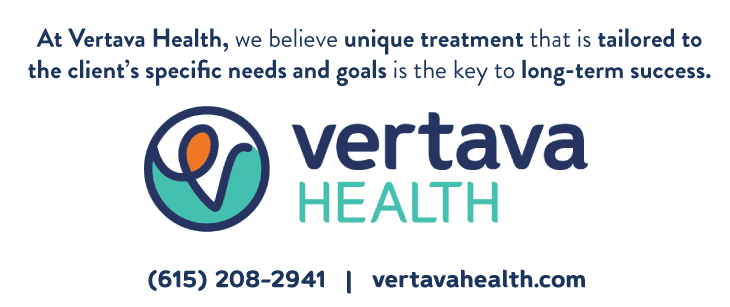
FAQs:
What does an anxiety attack feel like?
Many people have described anxiety attacks as a feeling of losing control. The person may feel dizzy or lightheaded, have trouble breathing, or have an increased heart rate. They may also experience intense sweating or shaking.
What happens during an anxiety attack?
Anxiety attacks are triggered by certain stressful emotions and situations. Symptoms may include worry, restlessness, and possibly physical symptoms, such as changes in heart rate.
How do you calm an anxiety attack?
Many people find that focusing on their breathing can be helpful during an anxiety attack. Taking slow, deep breaths increases blood flow and oxygen to the brain. This potentially helps the person regain control of their overwhelming anxiety.
What triggers an anxiety attack?
Because anxiety is unique to every person, the triggers for anxiety attacks will vary from person to person. For someone who suffers from an anxiety disorder, anything that causes fear or discomfort can potentially trigger an anxiety attack.
Find Relief for Anxiety Attacks at Vertava Health
If you or a loved one is interested in treatment options for anxiety attacks, contact our caring staff at 844.470.0410. We can help you manage your anxiety so you can live the life that you deserve.

